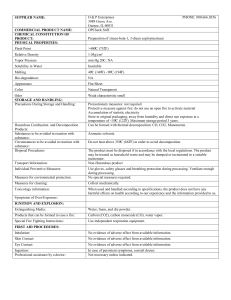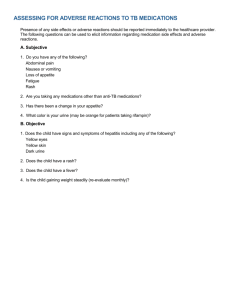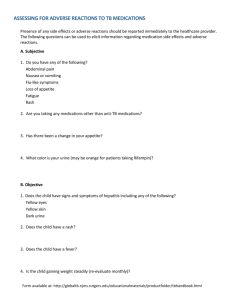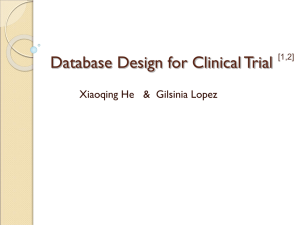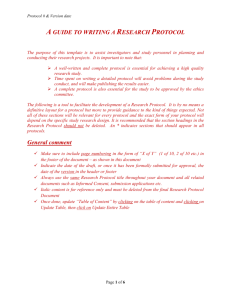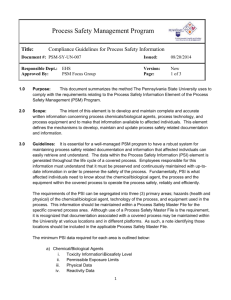Adverse Events Policies and Procedures
advertisement
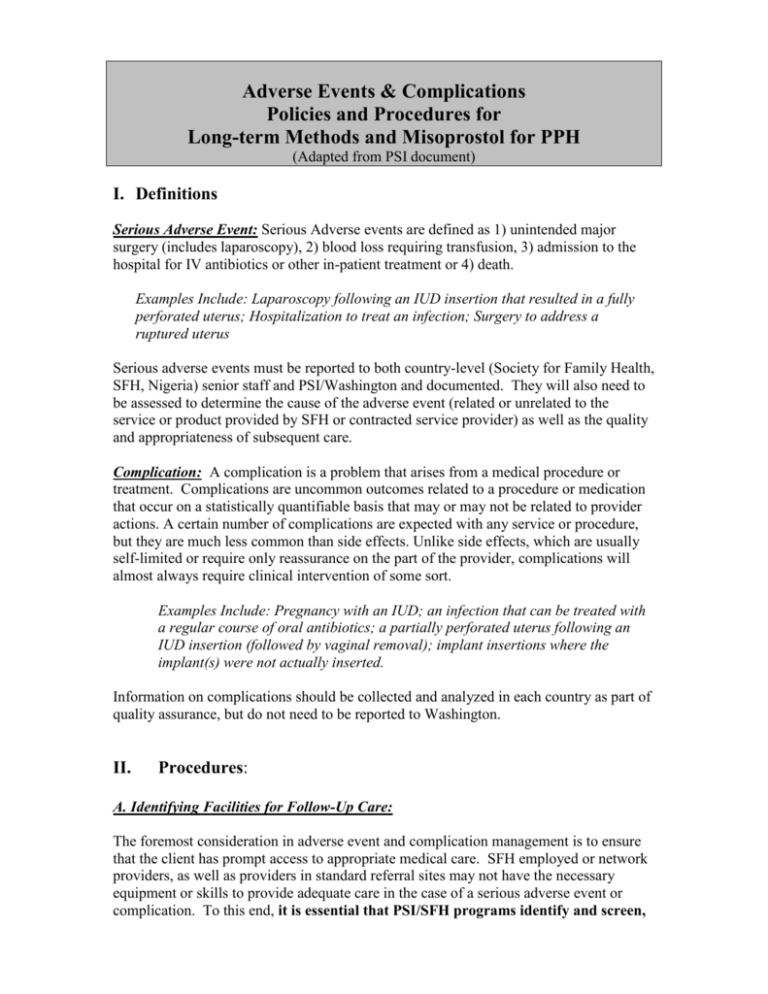
Adverse Events & Complications Policies and Procedures for Long-term Methods and Misoprostol for PPH (Adapted from PSI document) I. Definitions Serious Adverse Event: Serious Adverse events are defined as 1) unintended major surgery (includes laparoscopy), 2) blood loss requiring transfusion, 3) admission to the hospital for IV antibiotics or other in-patient treatment or 4) death. Examples Include: Laparoscopy following an IUD insertion that resulted in a fully perforated uterus; Hospitalization to treat an infection; Surgery to address a ruptured uterus Serious adverse events must be reported to both country-level (Society for Family Health, SFH, Nigeria) senior staff and PSI/Washington and documented. They will also need to be assessed to determine the cause of the adverse event (related or unrelated to the service or product provided by SFH or contracted service provider) as well as the quality and appropriateness of subsequent care. Complication: A complication is a problem that arises from a medical procedure or treatment. Complications are uncommon outcomes related to a procedure or medication that occur on a statistically quantifiable basis that may or may not be related to provider actions. A certain number of complications are expected with any service or procedure, but they are much less common than side effects. Unlike side effects, which are usually self-limited or require only reassurance on the part of the provider, complications will almost always require clinical intervention of some sort. Examples Include: Pregnancy with an IUD; an infection that can be treated with a regular course of oral antibiotics; a partially perforated uterus following an IUD insertion (followed by vaginal removal); implant insertions where the implant(s) were not actually inserted. Information on complications should be collected and analyzed in each country as part of quality assurance, but do not need to be reported to Washington. II. Procedures: A. Identifying Facilities for Follow-Up Care: The foremost consideration in adverse event and complication management is to ensure that the client has prompt access to appropriate medical care. SFH employed or network providers, as well as providers in standard referral sites may not have the necessary equipment or skills to provide adequate care in the case of a serious adverse event or complication. To this end, it is essential that PSI/SFH programs identify and screen, in advance, appropriate facilities, equipped for for follow-up care in the event of complications. These facilities should be made aware of the on-going activities in their area and provided with instructions on who to contact and/or how to report an adverse event. Appendix III includes a checklist for selecting facilities for follow-up care, based on possible adverse events. Means for on-going communications with referral sites, through regular phone calls, monthly or quarterly visits, etc, should be established. If possible, referral sites also should keep a log or records of patients originating from Women Health Project (WHP)provided services, including those who come to facilities with complications or requesting removal of an IUD or implant (see Section II.B.3: Documentation). B. Provider and Staff Procedures for Managing Serious Adverse Events: Procedures for addressing adverse events will vary by country and project structure. General principles for adverse events management that programs can adapt to their own circumstances are found below. Adverse event management can be broken into 3 broad categories: 1. Informing relevant PSI/SFH Staff: PSI supported programs must establish a reporting system or phone tree that specifies who to contact in the case of a serious adverse event and distribute this contact information to all who could potentially serve as the first point of contact (network providers, first-tier referral centers, IPC mobilizers/coordinators, etc). Keep in mind that the first point-ofcontact may be a non-medical person, such as an outreach worker or network coordinator. In these cases, a member of the WHP medical staff (Field Office Program Coordinator) should be informed as soon as possible of the event directly to through the Health Communication Coordinator, who supervises IPC mobilizers. The PSI Country Medical Director (senior manager, WHP/SFH), WHP Manager, and CR (MD/CTO/TA, SFH) must be informed within 24 hours of the original occurrence. The latter are responsible for informing PSI’s Global Director of Reproductive Health and Global Medical Director as soon as deemed appropriate, but not to exceed 24 Hrs. The Global Medical Director should be consulted immediately if there are questions related to treatment protocol and further guidance. 2. Treatment and Care: If symptoms are acute or life threatening, as with PPH, the patient should be transported to the nearest emergency health care facility and treated without delay. The PSI/SFH point-of contact should then be informed immediately. Any WHP/SFH staff or project affiliate who could potentially serve as a first point of contact should be provided with a list of pre-approved referral sites in their area. In addition, patients should be provided with a referral point or emergency contact. This could include a hotline number, the location and number of their provider or a referral clinic, mobilizer contact information, etc. After contacting the appropriate person at WHP/SFH, the first contact should direct the patient to the appropriate care facility. Where possible, a WHP/SFH medical staff member should consult by phone with an attending provider. For serious adverse events requiring higher level, non-urgent medical care, such as admission to a hospital for IV antibiotics, or recognition if need for surgery to remove an intra-abdominal IUD, the WHP Senior Manager should approve the proposed course of treatment whenever possible. 3. Documentation: If an adverse event occurs following a service or use of a product provided by WHP/SFH or affiliated or contracted provider, an Adverse Events Reporting Form must be filled out in all cases and provided to the country office for inclusion in the Global MIS of PSI. This includes instances in which it is ultimately determined that the adverse event was unrelated to a WHP/SFH provider action and/or the WHP/SFH product. Sample Adverse Event and Complications Forms can be found in Appendices I & II. An adverse event and complications form should be completed in all cases. As stated above, PSI supported programs should establish a system for referral sites to report any complications, adverse events, as well as IUD or implant removals. Forms should be compiled on a monthly basis and included in the country-level MIS. Adverse Events reporting, but not complications, should be included in monthly MIS submission to PSI/Washington. Complications should be documented and analyzed in country. Programs should monitor reports for trends, such as a high rate of IUD expulsions or infections from a particular provider or region, which could indicate a need for closer follow-up, or remedial training. Programs are responsible for following reporting requirements as mandated by local country policy. PSI/Washington and the Global Medical Director are available to review individual country procedures upon request. III. PSI Policies: Reimbursement & Compensation Serious Adverse Events: Following a serious adverse event, WHP/SFH medical staff should gather details in order to determine the causality (whether the event was caused by the actions of a WHP/SFH affiliated provider or product). If the event is assessed by WHP/PSI Medical Staff as being causally related to actions of WHP/SFH or a WHP/SFH-affiliated provider or staff, any costs related to urgent treatment and care should be covered by WHP/SFH. In some cases, this may include transport, childcare, compensation for time away from work, etc. Depending on the severity of the adverse event, WHP/SFH may consider other forms of client compensation on a case-by-case basis. In the latter case, please consult with PSI/Washington as well as local legal representation before proceeding. Special Note on Misoprostol for PPH: Adverse events occur during delivery with or without the use of misoprostol. Therefore, it may be difficult to distinguish between an adverse event related to the use of misoprostol and an adverse event caused by delivery complications. Programs who suspect they have an adverse event related to misoprostol but are unsure, should seek input from PSI’s Global Medical Director before establishing causality and issuing compensation. Complications: A certain number of complications can be expected for every method. While not obligated, as part of ensuring continuity of care, WHP/SFH may cover the costs of immediate, acute care directly related to the complication. This is recommended regardless of whether or not the complication is due to PSI affiliate actions. Examples include: a confirmed pregnancy following IUD insertion, an infection at the implant insertion site, despite provider adherence to WHP/SFH/PSI’s and internationally accepted protocols. In this case, it is recommended that PSI cover any costs related to treatment, (counseling, removal of the IUD in the case of a pregnancy and management of any resultant miscarriage, antibiotics, etc.) Special Note on Misoprostol for PPH: As with adverse events, it is difficult to link complications to the use of misoprostol. Therefore it is not recommended that platforms cover the cost of complications related, unless it can be clearly demonstrated that the event is the result of the product (Applicable to PSI supported platforms using misoprostol for prevention and management of PPH). Appendix I: LTM Adverse Event or Complication Form Who should complete this form: Providers or Clinics who receive a patient who is experiencing an 1) Adverse Event or 2) Complication related to an IUD or Implant Insertion. Patient Information: Name:_____________________________________________________________________________________ Age or age category:__________________________________________________________________________ Address or location: __________________________________________________________________________ Parity:______________________________________________________________________________________ I. ADVERSE EVENT (Include in Monthly MIS reported to Washington, along with this form. Note that the Global Medical Director and Global Director of Reproductive Health should have been informed immediately in the case of a serious adverse event). Date patient presented with problem: ___________________ Date of this Report: _______________________ Nature of Adverse Event: a. Unintended major surgery, including laparoscopy b. Blood loss requiring transfusion c. Infection requiring IV antibiotics or hospital admission d. Death Type of event or problem (check all that apply): a. Infection requiring IV antibiotics or hospital admission b. Complete Perforation or severe complication of insertion requiring surgery c. Other (fill in) _________________________________________________ Provide Details of Event or Problem: ______________________________________________________________________________ ______________________________________________________________________________ ______________________________________________________________________________ Outcomes (check all that apply) a. Hospitalization-initial or prolonged b. Referral to other site (fill in name of site)_____________________________ c. Patient was treated and situation was resolved successfully d. Situation has not been resolved Provide Details of Treatment and Outcome: __________________________________________ ______________________________________________________________________________ ______________________________________________________________________________ Describe Other Relevant Patient History, Including Preexisting Medical Conditions: __________ ______________________________________________________________________________ ______________________________________________________________________________ ______________________________________________________________________________ II. COMPLICATION (Complications should be tracked and documented for in-country tracking and follow up. They do not need to be reported to DC with the monthly MIS). Date patient presented with problem: ___________________ Date of this Report: _______________________ Type of event or problem (check all that apply): a. Pregnancy with IUD or implant in Place b. Partial Perforation c. IUD expulsion d. Infection that can be treated with regular course of antibiotics e. Other (fill in) ______________________________________________________ Provide Details of Event or Problem:_________________________________________________ ______________________________________________________________________________ ______________________________________________________________________________ ______________________________________________________________________________ Outcomes (check all that apply) a. Referral to other site (fill in name of site)________________________________________ b. Patient was treated and situation was resolved successfully c. Situation has not been resolved d. Other (fill in) ___________________________________________________________ Provide Details of Treatment and Outcome: ______________________________________________________________________________ ______________________________________________________________________________ ______________________________________________________________________________ Describe Other Relevant Patient History, Including Preexisting Medical Conditions: __________ ______________________________________________________________________________ ______________________________________________________________________________ III. Other INFORMATION Source of IUD or Implant: a. Provider at a private clinic (list name):_____________________________ b. Provider at public sector facility c. Mobile Clinic d. Other (list name): ________________________ (list date and location): ______________________________ (fill in)_________________________________________________ Product Type or Brand (e.g. Copper T, Multi-load, Jadelle, Implanon, Sino-Implant II) Name: _______________________________________________________________________ Information on Person Reporting Event: Name:_______________________________________Title:__________________________________________ _ Facility:______________________________________Phone Number:_________________________________ Address: ___________________________________________________________________________________ ****************************************************************************** For Completion by WHP/SFH/PSI Staff Only: Date WHP/SFH Informed:________________________ Date Reported to PSI/W (serious adverse events only):_________________________________ PSI Actions Taken Related to Patient Care: ______________________________________________________________________________ ______________________________________________________________________________ ______________________________________________________________________________ PSI Action Taken Related to Provider QA: ______________________________________________________________________________ ______________________________________________________________________________ ______________________________________________________________________________ Outcomes: ____________________________________________________________________ ______________________________________________________________________________ ______________________________________________________________________________ Appendix II: PPH Adverse Event Form Who should complete this form (two pages): Providers or Clinics who receive a patient who has taken misoprostol and presents with an adverse event resulting in transfusion, unintended major surgery, admission to hospital for treatment of infection, and/or death. Patient Information: Name:_____________________________________________________________________________________ Age or age category:__________________________________________________________________________ Address or location: __________________________________________________________________________ Parity:______________________________________________________________________________________ I. ADVERSE EVENT Date patient presented with problem:___________________ Date of this Report: _______________________ Type of event or problem (check all that apply): e. Severe PPH f. Ruptured Uterus g. Signs of infection Continuous: 1. pain for 24 hours or more 2. fever over 38˚C/100.4˚F for 24 hours or more 3. shivering for 24 hours or more 4. nausea and/or vomiting for 24 hours or more 5. diarrhea for 24 hours or more (fill in) ____________________________________________________________ h. Other Provide Details of Event or Problem:________________________________________________ ______________________________________________________________________________ ______________________________________________________________________________ ________________________ Outcomes (check all that apply) e. Hospitalization-initial or prolonged f. Major Unintended Surgery g. Transfusion h. Referral to other site (fill in name of site)________________________________________ i. Patient was treated and situation was resolved successfully j. Situation has not been resolved k. Death (fill in date) ___________________ Provide Details of Treatment and Outcome:__________________________________________ ______________________________________________________________________________ ______________________________________________________________________________ Describe Other Relevant Patient History, Including Preexisting Medical Conditions: ______________________________________________________________________________ ______________________________________________________________________________ ______________________________________________________________________________ II. PRODUCT INFORMATION Source of Misoprostol: e. Provider at a clinic or other health facility f. Pharmacy g. Other (list name):__________________ (list pharmacy name or location, if known):__________________ (fill in)__________________________________________________ Dose of Misoprostol:______________________ Route of Misoprostol administration:_____________________ Product Brand Name:____________________________________________________________ If Product packaging is available for inspection, fill in info below: Lot #: ________________________________Expiration date: ___________________________ Manufacturer Name and Location:_____________________________________________________________ Information on Person Reporting Event: Name:_______________________________________Title:___________________________________________ Facility:______________________________________Phone Number:_________________________________ Address: ___________________________________________________________________________________ ****************************************************************************** For Completion by PSI Staff Only: Date PSI Informed:________________________ Date Reported to PSI/W (serious adverse events only):_________________________________ PSI Actions Taken Related to Patient Care: ______________________________________________________________________________ ______________________________________________________________________________ ______________________________________________________________________________ PSI Action Taken Related to Provider QA: ______________________________________________________________________________ ______________________________________________________________________________ ______________________________________________________________________________ Outcomes: ____________________________________________________________________ ______________________________________________________________________________ ______________________________________________________________________________ Appendix III: Serious Adverse Event Facility NeedsMinimum Essential Requirements This table is to help programs determine the types of facilities needed for the management of serious adverse events. Condition Possible Causes Fully perforated uterus Ruptured Uterus Ectopic Pregnancy Facility Needs Facility Type Operating Room In-patient beds Anesthesia Laparoscopy (full thickness IUD perforation) Blood banking Tertiary /Referral Hospitals or Health Centers Blood loss requiring transfusion PPH complications Tertiary /Referral Hospitals or Health Centers IV antibiotics or admission to hospital for other serious infection Infection at insertion site Blood banking Intravenous lines In-patient beds Oxygen Intravenous lines IV antibiotics in stock Major Surgery Primary, Secondary, or Tertiary Care Hospital and Health Centers
